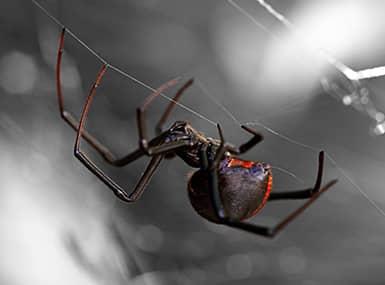Spiders are pests that most people prefer to see living outdoors rather than in their homes. There are spiders that you absolutely don’t want to have living anywhere near your family and friends. Black widow spiders and brown recluse spiders can be a safety concern since they are both venomous.
How To Identify Venomous Spiders
Unlike other house pests, spiders don’t enter your home for warmth or shelter. Instead, they enter either by accident or because they are following insects. It’s hard to tell how long spiders have actually been in your home since they’re good at hiding and usually remain unseen. They may use your home for a safe place to lay their eggs if they remain unbothered. It’s helpful to be able to identify both black widow and brown recluse spiders to ensure your safety should you encounter them in your home.
Here are a few identifying features to look for in these venomous spiders:
Black Widow Spiders
Black in color, though they do have orange or brown markings on their bodies and a signature red hourglass-shape on their underbellies.
Up to 1 ½ to 1 ¾ inches in length.
Shy and reclusive.
Prefer to live outside, but may enter homes through cracks in the exterior of the house or through gaps around windows.
Likely to be found in closets or other dark, rarely disturbed places.
Females build large, irregular-shaped webs and rarely leave them. Usually, there is a small tunnel she creates in her web to retreat if scared.
These spiders are venomous and their bite can affect a person’s nervous system. If bitten, seek medical attention right away.
Brown Recluse Spiders
The body of these spiders can grow to be 3/8th of an in length, with their total length reaching 1 ½ inches!
The color of a brown recluse spider varies depending on the species. It can range from yellow-gray to dark brown, and their legs are darker than the rest of their body.
They have a violin-shaped mark on the top of their bodies.
Three sets of eyes.
These spiders are unique in the way they catch their prey. They do not build webs, but rather hide under rock or wood piles. At night they come out and hunt down their food. As they’re hunting, they usually find their way inside a home on accident or following insects.
They hide in dark places inside homes, such as under furniture or clothes, and inside shoes.
The danger with having brown recluse spiders in your home is the fact that they can bite. They don't usually bother humans, unless they feel threatened or cornered. In these cases they will bite. Their bites can cause redness, burning, swelling, and itchiness for several hours. Other symptoms may include the development of nausea, vomiting, rash, fever, body aches, and a headache. It’s advised to seek medical attention after a bite from a brown recluse spider, as the site may ulcerate and become infected.
How To Keep Spiders Out Of Your Home This Winter
You are likely to see spiders in your home every now and then despite your efforts to keep them out. However, these prevention tips will significantly reduce their numbers:
Seal all cracks and crevices found around the exterior of your home’s foundation.
Repair screens and caulk around windows and doors.
Make sure wood piles are placed a good distance away from the exterior of your home.
Be sure to check shoes before putting them on and be careful handling clothing that has been lying on the floor.
Regularly clean areas of low activity, such as in closets and under furniture.
Contact a professional for guidance and prevention methods.
How To Get Rid Of Spiders
If you suspect that you have spiders in your Bettendorf home, Quik-Kill Pest Eliminators can help you. Our pest control technicians are well-trained and experienced in removing and preventing spider invasions. Don’t let these venomous creatures take over your house.
Schedule a free inspection with Quik-Kill Pest Eliminator's to learn how we can help keep your home free of pests.

